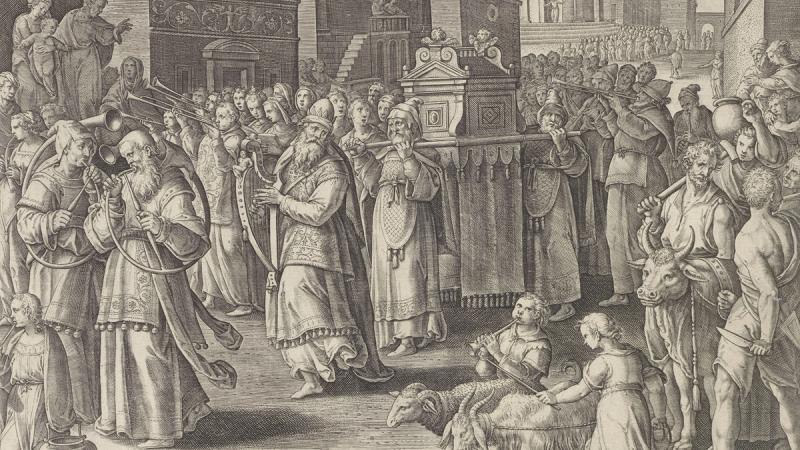Christ, as our Redeemer, executes the offices of a prophet, of a priest, and of a king, both in his estate of humiliation and exaltation.
Westminster Shorter Catechism, question 23
Utilized by many in the subsequent Reformed tradition, the threefold office presents Jesus Christ as prophet, priest, and king, who in his saving work fulfilled all the anointed offices of the Old Testament.
Kim Riddlebarger, “Basics of the Reformed Faith: Jesus as Prophet, Priest, and King”
In His work of redemption, Christ fulfilled the threefold office of prophet, priest, and king. To paraphrase the Westminster Shorter Catechism(questions 24-26), as a prophet, Jesus made God’s will for salvation known; as a priest, He gave Himself as a sacrifice for our sins and continues to intercede for us; as a king, He rules over us and conquers all God’s enemies.
These offices help us understand not only Christ’s work for us but also how the Old Testament prophets, priests, and kings point us to Him. The Old Testament prophets, priests, and kings were types of Christ, pictures or illustrations of aspects of who Jesus is and what Jesus has done for us. In each of these offices, Jesus surpasses the greatest Old Testament examples. He is a prophet greater than Moses, a priest greater than Aaron, and a king greater than David. He is the ultimate prophet, priest, and king.
What does that mean for us as believers? It means that through Christ, we know God’s plan for redemption, all our sins have been forgiven, and we have a King who preserves and defends us.[1] Each of us, as Christians, has been united to Christ through the work of the Spirit. Nothing can separate us from Him, and no one can take the benefits we receive away from us.
Those benefits include justification, being made right with God; adoption, being made sons of God; and sanctification, being made more and more like Christ.[2] As the Westminster Shorter Catechism explains, through these benefits, we also receive “assurance of God’s love, peace of conscience, joy in the Holy Spirit, increase of grace, and perseverance.”[3]
There are other benefits that we receive as Christians. Because we are united to Christ, we also partake in His anointing and are prophets, priests, and kings in Him. As the Heidelberg Catechism explains:
32. Q. Why are you called a Christian?
A. Because I am a member of Christ by faith and thus share in His anointing, so that I may as prophet confess His Name, as priest present myself a living sacrifice of thankfulness to Him, and as king fight with a free and good conscience against sin and the devil in this life, and hereafter reign with Him eternally over all creatures.
We aren’t called to be prophets in the Old Testament sense. We shouldn’t expect direct revelation from God or new instructions to pass on to God’s people. But we are called to share the gospel with others (1 Pet. 3:15), to teach and admonish each other (Col. 3:16), and to encourage and build each other up (1 Thess. 5:11).
With Christ’s death and resurrection, we do not need priests who offer sacrifices and mediate between God and us. Jesus’s sacrifice has paid for all our sins and given us direct access to God. We are a priesthood of believers, set apart to serve God (1 Pet. 2:9). We are called “to present [our] bodies a living and holy sacrifice, acceptable to God” (Rom. 12:1). We live our lives coram Deo, in the presence of God.
Christ’s disciples expected the Messiah to be an earthly king who would overthrow Israel’s political and civil government. But that wasn’t why He had come. Civil and political leaders come and go, but Jesus’ reign is forever. Until He returns and His enemies are all defeated, His kingdom is spiritual as He reigns in our lives. He doesn’t call us to be kings in the civil/political leadership sense. But through the work of the Spirit in us, we are enabled to fight against sin and evil. Ours is a spiritual battle (Eph. 6:12), and He has guaranteed the victory (1 Cor. 15:57).
Some see Christ’s office as prophet, priest, and king as a calling for husbands or a leadership model for pastors. But these aren’t unique callings just for a select few. Men and women, young and old, Jew and Gentile, are all joined together as the body with Christ as the head.[4] All of us, as Christians, are partakers in His anointing and are prophets, priests, and kings in Him. This is our present reality and our future. As G.I. Williamson explains:
We will never cease to be prophets, priests, and kings in union with and in submission to the Messiah. Through all eternity we will continue to share these offices with him. It really is a wonderful thing to bear the name of Christ!
G.I. Williamson, The Heidelberg Catechism: A Study Guide, 59
We have such rich blessings in Christ. We have been set free from the power of sin and death. We are declared and made righteous. We have access to God to bring our prayers and concerns directly to Him. We are co-laborers for the gospel and spiritual warriors fighting against sin and the devil. All of these are our spiritual inheritance.
Rachel Green Miller is the author of Beyond Authority and Submission. She is a member of the Orthodox Presbyterian Church and a popular blogger at A Daughter of the Reformation.
[1] See Heidelberg Catechism, question 31
[2] Westminster Shorter Catechism, questions 32-35
[3] Westminster Shorter Catechism, question 36
[4] Westminster Larger Catechism, question 66



